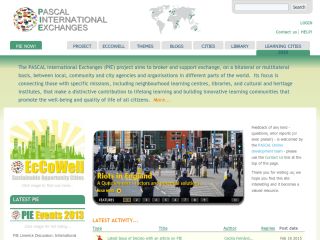Personal stories – narratives and analyses of what worked and did not work in ‘local’ change initiatives designed to create better understanding and stronger community
led by James Powell and Larry Swanson
Chris Duke has asked Larry Swanson and I to manage what he has called OTB Theme II. We both felt that it was important for PAC, and then PASCAL to keep ideas for discussion in the practical world of experience, exploring ideas at the local level and helping each other understand how to make a difference to ourselves. For example, someone starts with a notion that here is what some people are successfully doing in this place in the world (maybe in one of our many areas of interest, like learning cities, education re-invention, lifelong learning, workforce enhancement programming, future-casting, etc., etc.) and this is how it seems to be working out. Then we can have this serve as kind of a focus for expanded discussion within the box. But starting with something as much as this is practical, that’s actually going on and being done somewhere, that can then organize our thoughts and discussion.
Story-telling
In this theme we felt story telling is the right way for OTB to act. So, PAC members would say how their success was achieved with small steps forward and tell ‘type stories’ from real world examples – successes as well as failures and mixes. We believe that storytelling has been used in similar situations to our own, throughout the world, such stories also seem to show the underlying issues and the background story in a readily comprehensible way, and then show how things worked out, etc. Then people come in around these issues and the discussion become rich and there can be a lot of sharing of “experiences” --- sharing experience needs to be part of this, not just sharing opinions or competing values. So PAC would advocate that we build into this discussion a strong emphasis on participants sharing experiences from their professional work (we all would find this interesting and in the process get to know each other better) and also sharing perspectives around these experiences.
Theme Definition
This theme is about the personal experiences and exemplary case studies of PAC/PASCAL members to begin with – narratives and analyses of what worked and did not work in ‘local’ change initiatives designed to create better understanding and stronger community. The personal experiences and cases should be short and told as an easy to follow story.
The Stories begin...








I very much like Chris Duke's local French case story. It shows a simple, interesting and sustainable way of working so that normal citizens can bond together to begin to make a real difference for themselves. It is not always the big projects that achieve the most. Sometimes small events and lead to crucial participation and knowledge sharing. To me, its about knowing the local area and regions well, and in Chris's example, the Chardonnay's have helped generate better active citizenship. Chris and his wife have also learned skills, not only about gardening, but about woodland, pasture and field management. He and she have developed a different way of acting.
For PASCAL, it shows how place management, identifying with the locality and sharing knowledge virtuously really can make a big difference. It shows there is a life beyond the cities and how people can learn to survive and flourish by themselves in a rural context. It also shows how local communities can develop in a more sustainable way.
Finally, to me, it shows the importance of local solidarity, good leadership and why we all need to work closely together for the good of each other. The Chardonnay's have developed a workable face-to-face micro-democracy. PASCAL could help others do the same by sharing approaches of good practice and giving communities the confidence to try. Civil society must learn how to develop such local participation. Its about a new form of leadership. As my colleague Ivan Goldberg says in general about leadership:
'The answer for every leader is to devote time to thinking about their own local businesses because no-one else will do it, nor are others in general capable of it. The role of the leader is highly specialised and it takes time to consider what is the purpose of the community business, what are its objectives and what is the potential endgame.
As the great US golfer, Sam Snead said: “Take time out to smell the roses”
However the role of the leader is quite different. It is no longer functional; indeed it is truly multi-functional. It often takes some time to realise this fact when the leader is initially appointed. In fact I have known leaders (newly appointed) say: “if that is all I have to do I will be doing nothing half the time”. Quite true in the strict sense of the word because in the “doing nothing” part of the working day, it actually gives the leader some time to think. Remember thinking? It is that period of time in which we manage to put the inevitable small stuff to one side and actually get down to looking at the really important issues in the business.
A model of leadership which starts with its own people and then encourages them to give great service without exception.
Again, if you have someone whom you really can trust, ask them to tell you frankly and honestly what habits you have that irritate others and could well be changed.'
Do others have similar or parallel examples of good practice they can share?